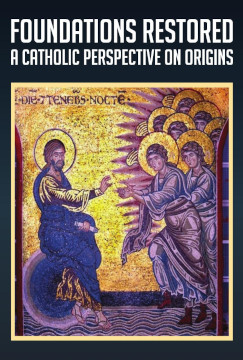- Welcome to St. Isidore forum.
Recent posts
#51
Anti-Modernism / “Life, liberty, and the pursui...
Last post by Geremia - November 04, 2023, 09:27:24 PMQuote from: Geremia on September 25, 2023, 05:26:10 PMGrant's CFN article "St. Robert Bellarmine: Herald of Republics? — Part II" mentions:This isn't correct. Locke pp. 103-4:Quote from: fn. 9"Life, liberty, and the pursuit of happiness," [...] [is] found in Locke's Second Treatise.
Quote from: Ed FeserTo be sure, Jefferson's formulation [in the Declaration of Independence] is by no means entirely Lockean in content. Locke would, for reasons we will examine presently, be more inclined to speak of rights to one's "life, health, liberty [and] possessions" (T II.6), though the pursuit of happiness is not entirely outside the range of his concern.
#52
Anti-Modernism / Happy feast of Christ the King...
Last post by Geremia - October 29, 2023, 07:32:20 PMfelix festum Domini Nostri Jesu Christi Regis! 🥳 🎉
#53
Forum-Related / Happy (belated) feast of St. I...
Last post by Geremia - October 29, 2023, 03:08:37 PMI meant to post this last Wednesday, October 25, as St. Isidore the Farmer (✝1130 A.D.) was named after the archbishop St. Isidore of Seville (✝636 A.D.).
From Fr. Butler's Lives of the Saints PDF pp. 1096-7:
From Fr. Butler's Lives of the Saints PDF pp. 1096-7:
Quote from: Fr. Alban ButlerST ISIDORE THE HUSBANDMAN (A.D. 1130)
In the United States of America this feast is celebrated on 25 October.
The patron of Madrid was born in the Spanish capital of poor parents, and was christened Isidore after the celebrated archbishop of Seville. Although unable to procure educational advantages for their son, his father and mother early instilled into his mind a great horror of sin and a love of prayer. As soon as he was old enough to work, Isidore entered the service of John de Vergas) a wealthy resident of Madrid, as a farm labourer on his estate outside the city, and with that one employer he remained all his life. He married a girl as poor and as good as himself, but after the birth of one son, who died young, they agreed to serve God In perfect continence. Isidore's whole life was a model of Christian perfection lived in the world. He would rise early to go to church, and all day long, whilst his hand guided the plough, he would be communing with God, with his guardian angel or with the holy saints. Public holidays he would spend in visiting the churches of Madrid and the neighbouring districts. Kind and helpful though he always was to others, he did not escape detraction. His fellow workmen complained that his attendance at church caused him to be late in starting work. To test the truth of this accusation, de Vergas hid himself to watch. He saw that Isidore did actually arrive after his fellow labourers, and he was advancing to upbraid him for his irregularity when he was surprised, we are told, to see a second team of snow-white oxen led by unknown figures ploughing beside that driven by Isidore. As he stood watching, rooted to the ground, the strange team disappeared and he realized that supernatural help had supplied all that was lacking. Other people also reported having seen angels assisting Isidore, and John de Vergas came to revere his servant who, it is said, worked miracles for the benefit of his employer and his family.
The saint's liberality to the poor was so great that he was wont to share his meals with them, often reserving for himself only the scraps they left over. On one occasion, when he had been invited to a confraternity dinner, he remained so long in church absorbed in prayer that the feast was nearly over before he made his appearance—followed by a train of beggars. His hosts expostulated, saying that they had reserved for him his portion, but that they could not possibly feed the whole crowd. St Isidore replied that there would be ample for himself and for Christ's poor. So, indeed, it happened, for when the food was produced there was enough and to spare for them all. Amongst the numerous stories told of the holy man is one which illustrates his love for animals. On a snowy winter's day, as he was carrying a sack of corn to be ground, he saw a number of birds perched disconsolately on the bare branches, obviously unable to find anything to eat. Isidore opened the sack and, in spite of the jeers of a companion, poured out half its contents upon the ground. When, however, they reached their destination the sack proved to be still full and the corn, when ground, produced double the usual amount of flour.
St Isidore died on May 15, 1130. His wife survived him for several years and, like him, is honoured as a saint. In Spain she is venerated as Santa Maria de la Cabeza, because her head (Sp. cabeza) is often carried in procession in times of drought. Forty years after the death of St Isidore his body was transferred to a more honourable shrine, and a great impetus was given to his cultus by the report of many miracles worked through his intercession. In 1211 he is said to have appeared in a vision to King Alphonsus of Castile, then fighting the Moors in the pass of Navas de Tolosa, and to have shown him an unknown path by means of which he was able to surprise and defeat the enemy. More than four hundred years later, King Philip III of Spain was taken so ill at Casaribios del Monte that his life was despaired of by the physicians. Thereupon the shrine of St Isidore was carried in solemn procession from Madrid to the sick monarch's room; at the hour the relics were removed from the church of St Andrew, the fever left the king, and when they were brought into his presence he recovered completely. The Spanish royal family had long desired to have St Isidore formally enrolled amongst the saints, and in March 1622 he was duly canonized together with St Ignatius, St Francis Xavier, St Teresa and St Philip Neri. In Spain this holy quintet are commonly spoken of as "The Five Saints".
The foundation document upon which our knowledge of the saint is almost entirely based is a life by "John the Deacon", probably identical with the Franciscan writer Johannes Aegidius of Zamora. It is printed in the Acta Sanctorum, May, vol. iii, but as it was compiled a century and a half after St Isidore's death it cannot be regarded as a very trustworthy record. A critical edition of this Latin text was published by Fr F. Fita, in the Boletín de la Real Academia de la Historia, vol. ix (1886), pp. 102-152. Lives in Spanish (including several poetical settings by Lope de Vega) and in Italian are numerous. The best biography is said to be that by Father J. BIeda (1622), and there is a more modern account in French by J. P. Toussaint (1901). But by far the most satisfactory treatment of the points of interest in the history of St Isidore is that published by Fr Garcia Villada in Razon y Fe, January to May, 1922. He in particular supplies very full details regarding the preservation of the body of the saint: it is mummified, but still entire.
#54
Theology / Re: St. Thomas Aquinas gives a...
Last post by Geremia - October 27, 2023, 08:26:48 PMSumma Theologica II-II q. 64 a. 6 co.:
Quote from: St. Thomas Aquinasit is in no way lawful to slay the innocent.
nullo modo licet occidere innocentem.
#55
Philosophy / Re: Metaphysics of Gender: A T...
Last post by Geremia - October 15, 2023, 10:04:44 PM- Finley, John. "The Metaphysics of Gender: A Thomistic Approach." The Thomist: A Speculative Quarterly Review 79, no. 4 (2015): 585–614.
- Newton, William. "Why Aquinas's Metaphysics of Gender Is Fundamentally Correct: A Response to John Finley." The Linacre Quarterly 87, no. 2 (May 2020): 198–205.
#56
General Discussion / Is the treatment of any type o...
Last post by Geremia - October 08, 2023, 04:10:13 PMHere's the current state of my new, edited question:
QuoteThe generic term for the treatment of an ectopic pregnancy seems to be "embryectomy":Quoteἐκ (ek, "out") + τέμνω (témnō, "to cut")Stedman, Practical Medical Dictionary (1916), p. 302 calls embryectomyQuoteThe operative removal of the product of conception, especially in ectopic pregnancy.However, I do not see this term used in recent medical literature. A Google Ngram search reveals:
"Salpingectomy" is much more common (embryectomy, salpingectomy Ngram):
Is embryectomy still the proper medical term for the treatment of any type of ectopic pregnancy, or is a different term used?
Note: I'm interested in the generic term covering all types of ectopic (extra-uterine) pregnancies, not just those that occur in the Fallopian tube.
If it is a tubal ectopic pregnancy, a salpingectomy is done, and this term is in current use in more modern medical books:QuoteFrom salping- ("of or relating to the salpinx [Fallopian tube]") + -ectomy ("surgical removal")which involves a simultaneous embryectomy.
Cf. the etymology of "ectopic":Quoteἐκ (ek, "out") + -topic τόπος (tópos, "place")
#57
General Discussion / Re: What is the treatment of a...
Last post by Geremia - October 08, 2023, 12:05:18 AMQuestion:
QuoteWhat is the treatment of an ectopic pregnancy called?Answer:
Note: I'm interested in the generic term covering all types of ectopic (extra-uterine) pregnancies, not just those that occur in the Fallopian tube.
QuoteThe generic term is "embryectomy".
"-ectomy" means "to cut out" or "excise" (cf. "-otomy", which means "to cut up into pieces"):Quoteἐκ (ek, "out") + τέμνω (témnō, "to cut")If it is a tubal ectopic pregnancy, a salpingectomy is done:QuoteFrom salping- ("of or relating to the salpinx [Fallopian tube]") + -ectomy ("surgical removal")which involves a simultaneous embryectomy.
Cf. the etymology of "ectopic":Quoteἐκ (ek, "out") + -topic τόπος (tópos, "place")
#58
General Discussion / What is the treatment of an ec...
Last post by Geremia - October 04, 2023, 05:15:45 PMI asked the Medical Science StackExchange question "What is the treatment of an ectopic pregnancy called?" and it was promptly closed:
![What is the treatment of an ectopic pregnancy called? [closed] Screen Shot 2023-10-04 at 16.42.13.png](https://isidore.co/forum/index.php?PHPSESSID=76hbn690cq60ftsqnq6cv2sl0k&action=dlattach;attach=31;image)
Maybe someone here can answer my question.
Sapingotomy / salpingectomy are specific to tubal pregnancies, but there are other types of extra-uterine (ectopic) pregnancies, as Bouscaren, S.J. notes, so it would seem there is a more general term.
Another strange thing is that Medical Sciences StackExchange's bot flags posts with links to isidore.co (inter alia). Most StackExchange sites don't do this.
Maybe someone here can answer my question.
Sapingotomy / salpingectomy are specific to tubal pregnancies, but there are other types of extra-uterine (ectopic) pregnancies, as Bouscaren, S.J. notes, so it would seem there is a more general term.
Another strange thing is that Medical Sciences StackExchange's bot flags posts with links to isidore.co (inter alia). Most StackExchange sites don't do this.
#59
Anti-Modernism / Re: U.S.'s Judeo-Masonic, Fren...
Last post by Paul_D - September 27, 2023, 07:00:33 PMI am afraid one of the conclusions Hanby has made in his article is true of many American Catholics, even within the SSPX (and Fr. Hunter is one of them, at least, IMHO):
They all think that because America was very prosperous and the Church in the US gaining converts greater than anywhere else in the period before Vatican II shows how great America is, when in fact the period after Vatican II showed how shallow that faith was. They also ignore very inconvenient truths, such as the continued persecution of the Church after the US' founding, and the attempt to attack Canada in 1812 to try to force liberty there against Catholics (which failed).
QuoteThis is why Lockean liberalism—with the mechanical world it presupposes and the Baconian world it sets in motion—more perfectly realizes Hobbes' absolutist ambitions than Hobbes himself does. Why repress the Church when you can entice Catholics to think like Protestants, or even like atheists, without knowing it?
They all think that because America was very prosperous and the Church in the US gaining converts greater than anywhere else in the period before Vatican II shows how great America is, when in fact the period after Vatican II showed how shallow that faith was. They also ignore very inconvenient truths, such as the continued persecution of the Church after the US' founding, and the attempt to attack Canada in 1812 to try to force liberty there against Catholics (which failed).
#60
Anti-Modernism / Re: U.S.'s Judeo-Masonic, Fren...
Last post by Paul_D - September 27, 2023, 06:47:18 PMAlso, I find this excerpt from Hanby pretty telling from the article I linked:
And this, too:
QuoteI have always understood the thought of the Founders as a complex amalgam of Protestant Christianity, Scottish Enlightenment moral philosophy, Baconian and Newtonian natural philosophy, and the Renaissance tradition of civic humanism. It is hardly an accident that we have a senate and a capitol, or that the young nation filled its new Rome along the banks of the Potomac with Greek and Roman temples. Nor is it an accident that the Founders did not build in Gothic; this fact alone ought to call into question Reilly's inordinate stress on the medieval Christian origins of the American Founding. "If any one cultural source lay behind the republican revolutions of the eighteenth century," Gordon Wood writes, "it was ancient Rome—republican Rome—and the values that flowed from its history."[38] If anything, Reilly's account of the Founding's Christian, natural law origins understates the Founders' neo-classicism in forming their republican imagination. The warnings of of Cicero, Sallust, Livy, and Tacitus against the corrosive effects of luxury and decadence fueled the Founders' own suspicions of the corrupting effects of "interest"—defined, in Madison's words, as "the immediate augmentation of property and wealth."[39] Roman history would also provide the archetypes after which they patterned themselves: Cato, sacrificing his life for his country; Cincinnatus, laying aside his commission to return to his farm.[40] Jefferson hoped, rather romantically, that the yeoman farmers he imagined would populate his empire of liberty would be such high-minded, disinterested men." " 'Ours,' he informed Crevecoeur in 1787, 'are the only farmers who can read Homer.' "[41] Though the radical liberty advanced by Jefferson and Thomas Paine would contribute to the dissolution of this republican vision even within the Founders' lifetimes, in their minds it also served as the precondition for any possible realization of that disinterested ideal.[42] " 'Interest,' many of them said, 'is the greatest tie man one man can have on another' ";[43] by contrast, the "classical ideal of disinterestedness was based on independence and liberty. Only autonomous individuals, free of interested ties and paid by no masters, were capable of such virtue."[44] The demise of this neoclassical vision and the dramatic transformation of the new nation into "a scrambling business society dominated by the pecuniary interests of ordinary people" prior even to the adoption of the Constitution, raises the enduring question of whether the Founders' republican ideal could survive the corrosive effects of Lockean liberty and its metaphysical underpinnings.[45] That it has not survived is beyond debate.
And this, too:
QuoteBen Franklin's Autobiography would've done, or Jefferson's Bible, which he hoped would "prepare the euthanasia for Platonic Christianity."[49] Apparently, Jefferson forgot that "Nature's God" "reveals himself as the divine Logos."
In extracting the pure principles which [Jesus] taught, we should have to strip off the artificial vestments in which they have been muffled by priests, who have travestied them into various forms, as instruments of riches and power to them. We must dismiss the Platonists and Plotinists, the Stagyrites, and the Gamelielites, the Eclectics, the Gnostics and Scholastics, their essences and emanations, their Logos and Demi-urgos, Aeons and Daemons male and female with a long train of Etc. Etc. Etc. or, shall I say at once, of Nonsense.[50]








